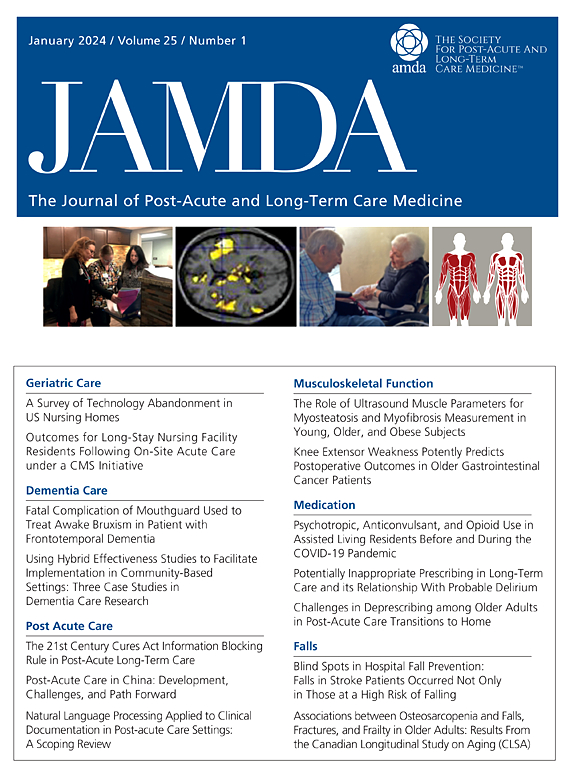牙齿数量与无痴呆症的预期寿命:日本老年学评估研究的 10 年跟踪研究。
IF 4.2
2区 医学
Q2 GERIATRICS & GERONTOLOGY
Journal of the American Medical Directors Association
Pub Date : 2024-09-11
DOI:10.1016/j.jamda.2024.105258
引用次数: 0
摘要
研究目的以往的研究表明,牙齿脱落与痴呆症风险增加有关;但很少有研究探讨牙齿数量与无痴呆症和总预期寿命之间的关系。我们研究了拥有更多牙齿是否与更长的无痴呆症寿命和总预期寿命有关:设计:2010 年至 2020 年的 10 年随访前瞻性队列研究:研究对象:居住在日本 9 个城市、年龄≥ 65 岁、功能独立的老年人:暴露是指牙齿数量(≥20颗、10-19颗、1-9颗和0颗)。以 10 年随访期内的痴呆发病率和死亡率作为结果。根据牙齿数量得出的无痴呆预期寿命和总预期寿命来自多州模型估算:共纳入 44,083 名参与者(男性占 46.8%)。平均年龄为 73.7 岁(标准差 [SD] = 6.0)。在随访期间,分别有 17.3% 和 21.4% 的参与者出现痴呆症和死亡。牙齿较少与痴呆症有关(危险比 [HR],1.14;95% 置信区间 [CI],1.07-1.22,10-19 颗牙齿;HR,1.15;95% CI,1.08-1.22,1-9 颗牙齿;HR,1.13;95% CI,1.男性和女性的 65 岁无痴呆预期寿命分别为:牙齿≥20 颗的 16.43 岁和 18.88 岁,牙齿 0 颗的 14.40 岁和 17.12 岁。牙齿≥20颗的男性和女性在65岁时的总预期寿命分别为17.84岁和22.03岁,牙齿为0颗的男性和女性分别为15.42岁和19.79岁:结论和影响:牙齿越多,无痴呆症和总预期寿命越长。本文章由计算机程序翻译,如有差异,请以英文原文为准。
Number of Teeth and Dementia-free Life Expectancy: A 10-Year Follow-Up Study from the Japan Gerontological Evaluation Study
Objectives
Previous studies have reported that tooth loss is associated with an increased risk of dementia; however, few have explored the association between number of teeth and dementia-free and total life expectancies. We investigated whether having more teeth is associated with longer dementia-free and total life expectancies.
Design
A 10-year follow-up prospective cohort study from 2010 to 2020.
Setting and Participants
Functionally independent older adults aged ≥65 years living in 9 municipalities in Japan.
Methods
The exposure was the number of teeth (≥20, 10–19, 1–9, and 0). Dementia onset and mortality within the 10-year follow-up were used as the outcome. Dementia-free and total life expectancies according to the number of teeth were derived from multistate modeling estimates.
Results
A total of 44,083 participants were included (men: 46.8%). The mean age was 73.7 years [standard deviation (SD) = 6.0]. During follow-up, 17.3% and 21.4% of the participants experienced the onset of dementia and death, respectively. Having fewer teeth was associated with dementia [hazard ratio (HR), 1.14; 95% confidence interval (CI), 1.07–1.22, 10–19 teeth; HR, 1.15; 95% CI, 1.08–1.22, 1–9 teeth; HR, 1.13; 95% CI, 1.05–1.21, 0 teeth] and death (HR, 1.13; 95% CI, 1.05–1.22, 10–19 teeth; HR, 1.27; 95% CI, 1.19–1.37, 1–9 teeth; HR, 1.47; 95% CI, 1.36–1.59, 0 teeth) compared with having ≥20 teeth. Dementia-free life expectancies at the age of 65 years were 16.43 years and 18.88 years with ≥20 teeth, and 14.40 years and 17.12 years with 0 teeth for men and women, respectively. The total life expectancies at the age of 65 were 17.84 years and 22.03 years with ≥20 teeth, and 15.42 years and 19.79 years with 0 teeth for men and women, respectively.
Conclusions and Implications
Having more teeth was associated with longer dementia-free and total life expectancies.
求助全文
通过发布文献求助,成功后即可免费获取论文全文。
去求助
来源期刊
CiteScore
11.10
自引率
6.60%
发文量
472
审稿时长
44 days
期刊介绍:
JAMDA, the official journal of AMDA - The Society for Post-Acute and Long-Term Care Medicine, is a leading peer-reviewed publication that offers practical information and research geared towards healthcare professionals in the post-acute and long-term care fields. It is also a valuable resource for policy-makers, organizational leaders, educators, and advocates.
The journal provides essential information for various healthcare professionals such as medical directors, attending physicians, nurses, consultant pharmacists, geriatric psychiatrists, nurse practitioners, physician assistants, physical and occupational therapists, social workers, and others involved in providing, overseeing, and promoting quality

 求助内容:
求助内容: 应助结果提醒方式:
应助结果提醒方式:


